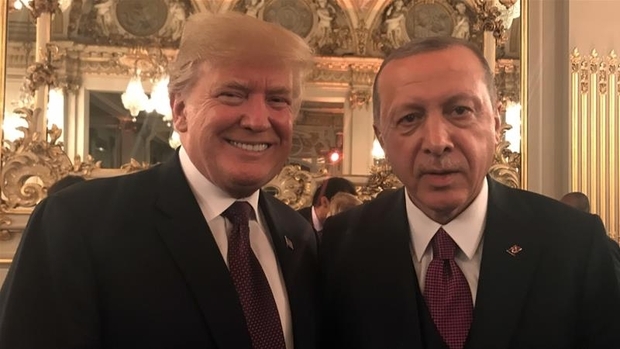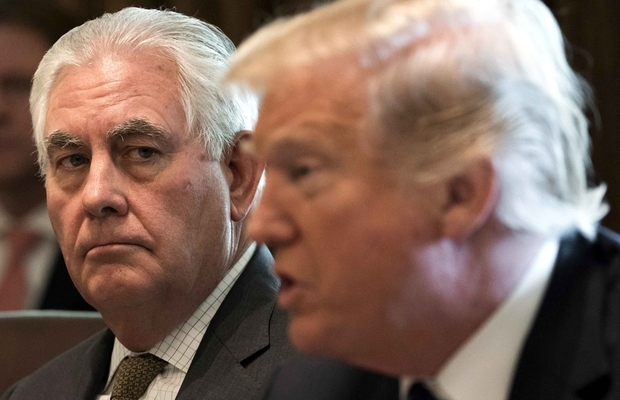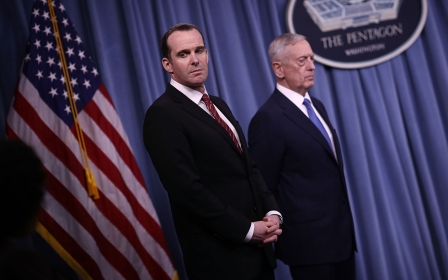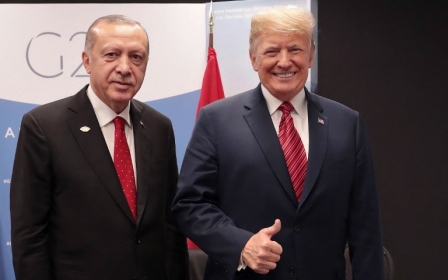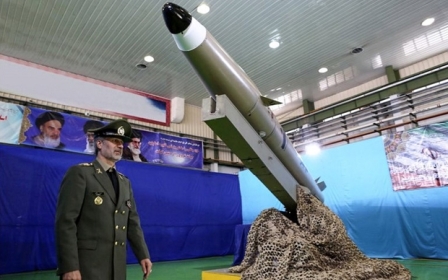A most tumultuous year: How Trump shook up Middle East policy
WASHINGTON - For analysts looking to decipher the "Trump doctrine", the Middle East may not be the best place to start.
Over the past year, Donald Trump has pursued policies that have bewildered allies and foes alike, challenging longstanding perceptions and expectations of Washington's role in the region.
The chaos was rapidly apparent, as Trump ended 2018 without any of the top foreign policy aides who were in office in January.
Over the course of 12 months, his secretary of state, national security adviser, secretary of defence and ambassador to the United Nations were out - all fired or opting to leave the administration.
The president's policy decisions were no less erratic.
He imposed sanctions on officials in NATO ally Turkey, left the Iran nuclear deal without consulting with European countries that had signed on to the accord, announced the withdrawal of US troops from Syria against the advice of his own generals and abandoned international institutions to spite Palestinians.
Here's a look at Trump's tumultuous year in foreign policy, with a special focus on Syria, Turkey, Iran and Palestine.
Syria pullout
In the final month of 2018, Trump finally got his way, announcing the withdrawal of US troops from Syria against the advice of his own generals and top advisers.
The move sent shockwaves through Washington and resulted in Defence Secretary James Mattis quitting in protest.
For months, Trump had been pushing for the pullout, only to be publicly rebuffed by US military leaders and officials who challenged his claim that the Islamic State (IS) group had been defeated in the war-torn country.
"We're knocking the hell out of ISIS. We'll be coming out of Syria like very soon. Let the other people take care of it now," the president said in late March.
Days later, Brett McGurk, the US special envoy for the global coalition fighting IS, said the US military's mission in Syria "isn't over", stressing that troops are going to "complete that mission". McGurk resigned after the White House declared that the troop withdrawal was already underway.
Trump's efforts to withdraw US forces from Syria were derailed months earlier, when an alleged chemical attack outside Damascus in April was blamed on Syrian government forces. Washington responded with limited air strikes on state military targets.
As he announced the strikes, Trump stressed that he didn’t want US forces to be deeply embedded in the conflict. "America does not seek an indefinite presence in Syria," he said. "As other nations step up their contributions, we look forward to the day when we can bring our warriors home."
Washington has about 2,000 troops in Syria, whose stated goal was to defeat IS. But Trump administration officials also spoke of using the Syria deployment to contain Iran, counter Russia and weaken the government of Syrian President Bashar al-Assad.
After the decision to withdraw US troops was announced, the president's critics accused him of abandoning Washington's Kurdish allies, who have been credited with driving IS out of large swathes of Syrian territory.
Without US protection, Kurdish fighters in the Syrian Democratic Forces (SDF) have been left vulnerable to attacks from a Turkish government that views them as terrorists and from the Syrian government, which is eager to stem attempts to establish a self-governed Kurdish region in the country.
Despite that critique, however, Trump appears more concerned with appealing to his nationalist base in the US, which perceives foreign wars as a waste of the country's resources.
"The president is right about one big thing, which is that the American people don't want to get more involved in the Syrian civil war," former US ambassador to Syria Robert Ford told MEE in April. "Of that I am completely convinced."
Turkey: Conflicts resolved
After a year of controversies, threats, confrontations and crises, Trump ended the year on good terms with Turkey.
The year ended with the release of US pastor Andrew Brunson, the US decision - applauded by the Turkish government - to withdraw from Syria, and an invitation for US military officials to visit their counterparts in Turkey.
But 2018 was a critical test for the White House's relations with Ankara.
Throughout the year, Turkish President Recep Tayyip Erdogan criticised the Trump administration for its continued support of Kurdish fighters in Syria, viewed as a threat to national security by the Turkish government.
At the height of tensions between the two NATO allies, Erdogan penned an article in the New York Times in August, demanding Washington respect Turkey's sovereignty and concerns.
"Before it is too late, Washington must give up the misguided notion that our relationship can be asymmetrical and come to terms with the fact that Turkey has alternatives," he wrote in what was widely viewed as an apparent Russian-Turkish rapprochement.
"Failure to reverse this trend of unilateralism and disrespect will require us to start looking for new friends and allies."
The Trump administration had imposed sanctions on top Turkish officials earlier in the summer over the detention of Brunson, the US pastor who was facing terror-related charges in Turkey. Ankara retaliated with its own sanctions against two high-ranking US officials.
Before it is too late, Washington must give up the misguided notion that our relationship can be asymmetrical and come to terms with the fact that Turkey has alternatives
-Turkey's Recep Tayyip Erdogan
Trump personally took up the pastor's case, calling him a "fine gentleman and Christian leader" in the US, who he said was "being persecuted in Turkey for no reason".
The strain in the relations did not last long, however.
As Turkey turned its attention to the murder of Saudi journalist Jamal Khashoggi at the kingdom's consulate in Istanbul, Brunson was freed in October. The reciprocal sanctions were lifted, and the two countries started to appear to be allies again.
In a massive strategic victory for Ankara, Trump announced in December that US troops would withdraw from Syria, effectively giving Turkish troops and allied local forces in the north of the country a greenlight to attack the Kurdish fighters credited with defeating IS.
By the end of 2018, Trump dubbed his Turkish counterpart a man who can defeat IS.
"During the Brunson process at one point, Americans took an attitude of almost not engaging with us," a Turkish presidential source told MEE in November.
"After his release, we can say we returned to a determination to improve ties."
Pressuring Palestinians
Trump continued to push aggressive, pro-Israel policies throughout 2018, highlighting his stance towards Palestinians only two days into the new year, when the president tweeted on 2 January that Washington gets no appreciation from Palestinians despite giving them "HUNDRED (sic) OF MILLIONS OF DOLLARS".
Trump largely maintained that tone over the next 12 months, as his administration would gradually dismantle aid programmes for Palestinians, including humanitarian assistance to East Jerusalem hospitals and support for the UN agency helping Palestinian refugees (UNRWA), and shut down the Palestine Liberation Organisation's office in Washington.
The Trump administration publicly vilified international organisations as it sought to shield Israel from criticism, pulling Washington out of the UN Human Rights Council in June over what it said was bias against Israel and threatening to impose sanctions on International Criminal Court officials should they dare prosecute Israel for war crimes.
At the end of the day, you cannot erase people by cutting funding to them
- Omar Baddar, Arab American Institute
The US president and top figures within his administration also regularly defended the Israeli army's deadly use of force against Palestinian protesters in Gaza, who have turned out every Friday for wide-scale demonstrations, dubbed the Great March of Return.
In fact, the most violent Israeli crackdown on demonstrators in Gaza came on 14 May, as Trump's top advisers, including his daughter Ivanka and son-in-law, Jared Kushner, celebrated the opening of the US embassy in Jerusalem. The Israeli army fatally shot 60 peaceful Palestinian protesters and injured thousands more that day.
The following day, Washington's ambassador to the UN, Nikki Haley, said Israel had acted with restraint and blamed the violence on Palestinian faction Hamas.
She also defended the widely condemned embassy move, saying in a Security Council meeting that "it does not undermine the prospects for peace in any way".
Haley, a fierce defender of Israel, announced her resignation in October, and will be replaced by US State Department spokeswoman Heather Nauert in early 2019.
In one of her last official acts as ambassador this month, Haley sought to pass a resolution at the UN General Assembly condemning Hamas, but it was blocked.
Analysts say Trump's hostile policies towards Palestinians aims to pressure them to accept his peace plan, dubbed "Deal of the Century", which has yet to be released publicly.
The proposal reportedly offers Palestinians a provisional government without Jerusalem as the capital of a future Palestinian state, while keeping major Israeli settlements across the West Bank. Palestinians have already rejected the plan and vowed to defeat it.
In spite of Trump's aid cuts and diplomatic offensive, however, Palestinian advocacy against the Israeli occupation seemed to have been emboldened over the last year.
The PLO's central council voted to suspend its recognition of the state of Israel in a meeting attended by President Mahmoud Abbas in October, while thousands of Palestinians have continued to attend protests in Gaza.
"At the end of the day, you cannot erase people by cutting funding to them," Omar Baddar, deputy director of the Arab American Institute, told MEE earlier this year.
Iran: 'Sanctions are coming'
The Iranian nuclear deal did not survive Trump's second year in office.
As a candidate, Trump had campaigned against the nuclear agreement, describing it as the "worst deal ever negotiated".
The multilateral pact, signed by Tehran and several world powers, saw Iran drastically scale back its nuclear programme in exchange for the lifting of US-led economic sanctions.
Despite the president's outbursts against the deal, Trump's first Secretary of State, Rex Tillerson, pushed throughout 2017 for remaining a party to the agreement.
They did so in May, and European countries - whose companies had started striking business deals with Iran after the deal was inked - were livid.
"Looking at the latest decisions of President Trump, someone could even think: With friends like that, who needs enemies?" European Union chairman Donald Tusk said after the US withdrawal.
The EU managed to convince Iran to uphold its end of the bargain, as the UN atomic watchdog (IAEA) regularly certified that Tehran was implementing the restrictions set out in the agreement.
That didn’t stop the US from reimposing its own economic sanctions, however.
"Sanctions are coming," Trump tweeted on 2 November, days before US sanctions hit Iran's oil sector. The tweet, framed and captioned as if to appear from the popular HBO show Game of Thrones, highlighted Trump's simplistic approach to Iran, critics said at the time.
The sanctions did not alter Iran's behaviour or influence in the region, nor did they force Tehran to renegotiate the deal – as the Trump administration has said they intended to do.
Iranian leaders turned down Trump's offers for direct talks, stressing that only a US return to the nuclear pact would open the way to future negotiations.
Meanwhile, Tehran is setting up a barter system with Europe to allow trade to flourish without exchanging dollars, thus evading the scrutiny of Washington and US financial institutions.
"Iran is the most experienced country in the world [at] handling sanctions. I don't believe any other country in this region has the experience, capacity or scale to resist against sanctions," Seyed Hossein Mousavian, a former Iranian diplomat and Middle East policy specialist at Princeton University, told MEE in November.
This is part one of two Middle East Eye reports on Donald Trump's 2018 Middle East policy decisions. To read part two, which zeroes in on Trump's support for Saudi Arabia and the country's crown prince, Mohammed bin Salman, click here.
Stay informed with MEE's newsletters
Sign up to get the latest alerts, insights and analysis, starting with Turkey Unpacked
Middle East Eye delivers independent and unrivalled coverage and analysis of the Middle East, North Africa and beyond. To learn more about republishing this content and the associated fees, please fill out this form. More about MEE can be found here.


